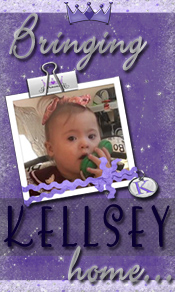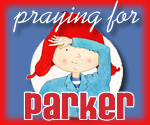Someone just recently posted this on a board I frequent and thought it was interesting.
**Talking about Down syndrome? A language guide.
Appropriate Language
Communicating about individuals with Down syndrome with both positive and accurate language is an important element to advocacy. It is often difficult to confront someone who has hurt us with their words or labels.
So often, family and friends do not know what to say. Knowledge is key and this simple guide is meant to help others speak in ways that are more politically correct, avoiding hurtful and offensive language.
The contents of this brochure have been modified and reprinted from “How Do I talk About Down Syndrome?” by UPS for DownS (United Parent Support for Down syndrome, a volunteer organization of parents of children with Down syndrome based in the Northwest Suburbs of Chicago.)
“How often misused words generate misleading thoughts.” Herbert Spencer (1820-1903)
Appropriate Words
Baby/Child/Person with Down syndrome – the emphasis should always be on the person first, not the disability. This is referred to as first person language. When we take care to put children first, and let the disability remain in the background, we are teaching others where the emphasis needs to be.
Developmentally Delayed – this term is the common reference to describe delays in development, such as language, walking, and all other areas of a child’s learning process. Most families find it less offensive than the term mentally retarded.
Has Down syndrome – Someone who has Down syndrome is not a victim of, diseased by, nor do they suffer from or are they afflicted with Down syndrome.
Mental Retardation – This is an accurate term to describe developmental functioning level, but is less acceptable to many parents than the term “developmentally delayed.” Use it with caution.
Typically developing/Non-disabled child – Both of these terms are acceptable and positive ways to refer to people who do not have Down syndrome or another disability.
Inappropriate Words
A Down(s) - A person with Down syndrome is not the disability. There are many other things that should, and do, define that person. It is dehumanizing and strips people of their dignity to be referred to as a disability. Instead of saying “He is a Down” or "She is Downs,” try “He or she has Down syndrome.”
Down syndrome Child/Baby – This goes back to referring to the person first, not the disability. This is one of the most common misstatements made and often causes parents to cringe, at least inwardly.
Normal kids – Please realize that we perceive our children as being pretty normal kids. Comparing them to normal children implies that a child with Down syndrome is something less than normal.
Retard/Retarded – Currently, the best reference is developmentally delayed (for children) and developmentally disabled (for adults).
Mongolism – This is an extremely outdated term that was once used to refer to people with Down syndrome. The word should never be used when referring to or about someone with Down syndrome.
“They” as in “they are so loving; they smile all the time; they are always happy.” - Don’t generalize about people with Down syndrome. “They” are not all alike; nor are they “eternal children.” Much like non-disabled children, kids with Down syndrome have a full range of emotions and will mature and grow into adulthood.
“How mild/severe is it?”- A person either has Down syndrome or they do not. Down syndrome is not an illness. Having Down syndrome does not mean a person is sick.
“But you’re so young!”- Although the chances of a woman having a child with Down syndrome increase significantly over the age of 35, there are far more children with Down syndrome born to younger mothers.
Handicapped – Use ‘has a disability” instead.
Downs or Down’s syndrome – There is no “s” or “’s” in the first name of this syndrome, and recent practice holds that the “s” in syndrome is not to be capitalized.
Suffers from/Afflicted with Down syndrome – Our children are not suffering or afflicted. We must instill a great sense of pride and self-esteem in all children, so should ensure that we do not make anyone feel that Down syndrome is something terrible or something to be ashamed about.
Vocabulary
Early Intervention – Services provided to infants and toddlers with disabilities ages birth to three and their families through a comprehensive program or individual providers.
IFSP/IEP – Individualized Family Service Plan (early intervention document) and Individual Education Plan (public school document.)
Speech Therapy – Works on language, listening and feeding issues.
Physical Therapy – Works on gross motor skills for large muscle groups, such as walking, sitting, crawling.
Occupational Therapy – Works on fine motor skills, such as manipulating objects with hands.
Hypotonia – Low muscle tone, common in people with Down syndrome.
Chromosome abnormalities – It is an “abnormality” of the 21st chromosome that causes Down syndrome. All of the other chromosomes are normal. Even the 21st chromosome is normal. There is just too much of it. Down syndrome is not caused by anything that the parents did before or during pregnancy.
Nondisjunction Trisomy 21 – Is the most common type of Down syndrome (95%) and means that instead of two 21st chromosomes, a baby was born with three 21st chromosomes, thus causing them to have Down syndrome. This division of chromosomes occurs immediately at conception. The extra chromosome is found in all cells. Most people have 23 pairs of chromosomes.
Mosaicism – This is the least common form of Down syndrome (1-2%). Chromosomes divide unevenly, but not until the second or third cell division after conception, meaning only some of the cells have the extra chromosome.
Translocation – A part of the 21st chromosome has broken off and attached itself to another chromosome, providing extra genetic material in all of a person’s cells. Only 2-3% of babies with Down syndrome have translocation.
5 years ago





No comments:
Post a Comment